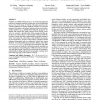Free Online Productivity Tools
i2Speak
i2Symbol
i2OCR
iTex2Img
iWeb2Print
iWeb2Shot
i2Type
iPdf2Split
iPdf2Merge
i2Bopomofo
i2Arabic
i2Style
i2Image
i2PDF
iLatex2Rtf
Sci2ools
POPL
2009
ACM
2009
ACM
The theory of deadlock avoidance via discrete control
Deadlock in multithreaded programs is an increasingly important problem as ubiquitous multicore architectures force parallelization upon an ever wider range of software. This paper presents a theoretical foundation for dynamic deadlock avoidance in concurrent programs that employ conventional mutual exclusion and synchronization primitives (e.g., multithreaded C/Pthreads programs). Beginning with control flow graphs extracted from program source code, we construct a formal model of the program and then apply Discrete Control Theory to automatically synthesize deadlockavoidance control logic that is implemented by program instrumentation. At run time, the control logic avoids deadlocks by postponing lock acquisitions. Discrete Control Theory guarantees that the program instrumented with our synthesized control logic cannot deadlock. Our method furthermore guarantees that the control logic is maximally permissive: it postpones lock acquisitions only when necessary to prevent deadlocks, ...
Control Theory Guarantees | Discrete Control Theory | Dynamic Deadlock Avoidance | POPL 2009 | Programming Languages |
Related Content
| Added | 22 Nov 2009 |
| Updated | 22 Nov 2009 |
| Type | Conference |
| Year | 2009 |
| Where | POPL |
| Authors | Manjunath Kudlur, Scott A. Mahlke, Stéphane Lafortune, Terence Kelly, Yin Wang |
Comments (0)

